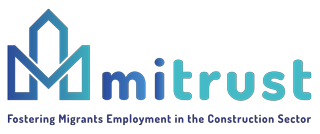Project
Our Aim
Difficulties
The construction industry accounts for 11-13% of global GDP. In Europe, it employs 18 million people directly and creates 9% of the EU GDP. One of the main objectives of the EU’s Construction 2020 Strategy refers to the improvement of the human capital basis to boost the performance of companies and the EU competitiveness in this sector. Boosting new competencies of the sector’s workforce is a key aim of the “BUILD UP Skills Initiative” with specific attention to vocational training and the digital component.
The construction industry is one of the top 10 principal sectors of employment for migrants, both in the EU and globally. Migrant workers can be found in considerable numbers in all construction domains. Thus, their contribution to the construction industry is important worldwide.
However, according to the latest report of the European Construction Sector Observatory (ECSO report, 2020) specific barriers are identified related to the training of migrant construction workers:
- lack of the new technologies that support the access of migrant workers to training resources.
- cultural and linguistic barriers that may pose a difficulty for attending training programs. Thus, low-skilled migrant workers are at the risk of losing their jobs.
According to CEDEFOP, global competition and rapid technological changes have affected the EU construction sector and construction workers are forced to cope socially and remain employable by developing new technical, language, and soft skills. Therefore, an increased need for VET support within the construction industry is identified, which is closely related to the partnership between sectorial companies and VET providers. However, there is still a lack of investment in skills training by construction companies due to a variety of reasons (market failures, unaffordable costs, etc.).
Another challenge that should cause concern within the construction industry is the informal experience of migrant workers and their prior learning recognition. Last, but not least, language improvement in terms of construction terminology was mostly acquired at the workplace and in real-time (in situ) until now. The impact of COVID19 has affected this type of learning due to the demand of keeping social distance and working as remotely as possible.
Target Groups
- Migrants who would like to work in the Construction Industry
- VET Providers with Construction Department
- Tutors and trainers working with migrants in the Construction Sector
- Businesses & Construction Associations
- International, European, National, and Local authorities
- Media
- National and Local media
- Other stakeholders in the field of migration, employment, and social affairs
- Other VET Providers offering training schemes to migrants in Construction Sector
- Employers and associations involved in Construction Sector
- Local Societies, that are hosting migrants and face the challenge of integration
- Universities and Academics researching ways/tools for migrant integration
- Administrations are responsible for migrants (i.e. Ministries of Education, Ministries of Employment, Ministries of Migrant Policy, etc).
- Other European public administrations operating at local and regional levels and their networks
Target groups at the local, national, and EU levels
- Local communities/general population
- Media (traditional and web media)
- NGOs, migrants’ associations
- Members of Business Associations
- Businesses in Construction Sector
- Public opinion in general
- Opinion leaders
- Public institutions/Local, National, and European authorities
- National and international VET providers which usually acquire a strong network across Europe, have an enhanced dissemination capacity and influence the provision of related services on a transnational level
- National/European public/private organizations operating in the field of VET education
Social Inclusion
MiTrust envisages having a real impact to support migrants and tutors/trainers in the EU construction industry and increasing migrants' access to employment through their foreign languages and soft skills upskilling. This will affect positively the employability and the social inclusion of the migrant population and increase the attractiveness of the construction industry.
MiTrust project will
- provide recommendations for the creation of new innovative VET curricula and pedagogies
- facilitate the mobility of staff (migrant workers and employees) in the construction sector
- allow the transferring of knowledge and promote best practices in the field of vocational training and
- enhance the regional cooperation between the countries
The ultimate goal is to boost the EU initiatives regarding “working towards a knowledge economy” and to bring positive implications on EU competitiveness of construction labor markets.

 English (United Kingdom)
English (United Kingdom)  Deutsch (Deutschland)
Deutsch (Deutschland)  Greek (el-GR)
Greek (el-GR)  Turkish (Turkey)
Turkish (Turkey)  Funded by the European Union. Views and opinions expressed are however those of the author(s) only and do not necessarily reflect those of the European Union or the European Education and Culture Executive Agency (EACEA). Neither the European Union nor EACEA can be held responsible for them.
Funded by the European Union. Views and opinions expressed are however those of the author(s) only and do not necessarily reflect those of the European Union or the European Education and Culture Executive Agency (EACEA). Neither the European Union nor EACEA can be held responsible for them.